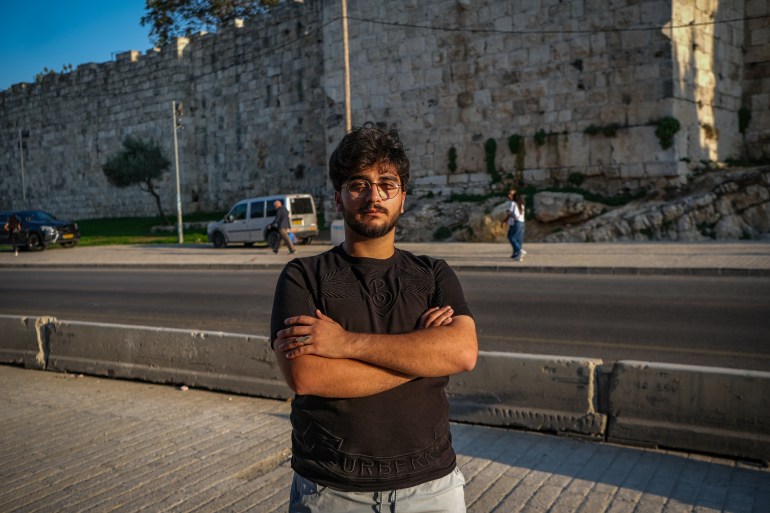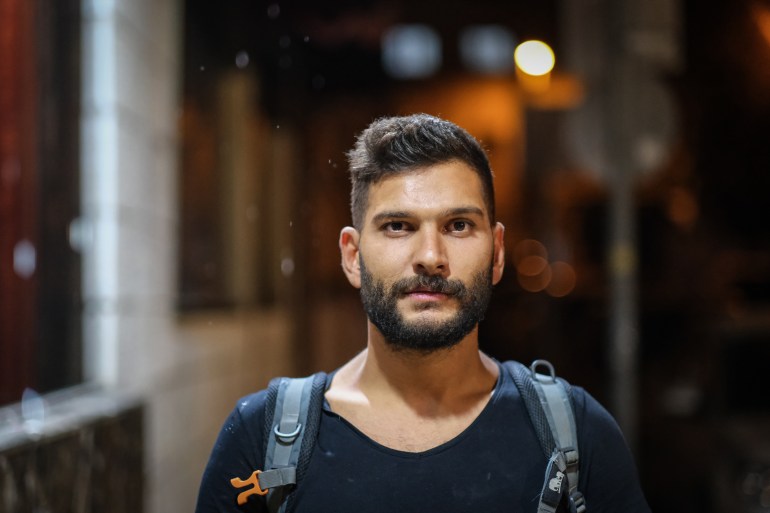Occupied East Jerusalem – Adnan Barq, a quick-witted 23-year-old, skirts around the ancient walls of Jerusalem’s Old City, looking for a way back home.
He eyes one of the seven guarded gates that line the UNESCO World Heritage Site through a slick pair of dark-rimmed glasses; groups of Israeli soldiers are pacing in front of the arched entrance, picking out people to stop and frisk.
He doesn’t like what he sees. Flicking his head, he walks past the gate and up a main street lined with fruit stalls and busy vendors offering street food.
“It’s about reading the room,” he quips.
Barq, like many other Palestinians from the Old City, has grown used to being harassed when heading back home to the Old City by Israeli soldiers and police over the years.
That was until last week when the Palestinian group Hamas broke out of the besieged Gaza Strip and attacked communities in the south of Israel.
Since then, Barq says, the Palestinians of the Old City have faced unprecedented levels of harassment.
According to Palestinians from the Old City whom Al Jazeera spoke to, they now face new interrogation tactics at its entry points, including phone searches, increased use of physical force and vulgar insults.

WhatsApp and Telegram groups, populated by young Palestinian men, are rife with countless surreptitious recordings of such events, with subscribers offering advice on avoiding having personal devices accessed.
A short walk along the walls shows how Palestinian men are regularly singled out and pushed up against the Old City’s distinct limestone walls, their legs pushed apart as they are frisked.
Hamza Afghani, a 27-year-old Palestinian tour guide from the Old City, says he was recently subjected to physical harassment, followed by a tirade of insults directed at female family members.
With the current climate in the country among the security forces, he says there is zero tolerance for any pushback, leaving him feeling helpless.
“Before, you could talk back. But now they would frame you as an attacker, without any accountability because there is a state of emergency,” he says.
The insults, mainly directed at young men, are also intended to provoke a reaction.
“The Israeli soldiers know for us as Palestinians – of whom the majority are Muslims – cursing women is a red line, so they provoke our feelings to push back,” he explains.
Sari, a 24-year-old chef who works at a trendy burger restaurant in occupied East Jerusalem, now fears returning to his home in the Old City every night.

The regular searches used to be bearable, but over the last week, he says, the actions of the police and soldiers have left his family members deeply traumatised.
A night-time raid on his family home left his father terrified and holed up in their home, begging Sari not to go to work.
“The soldiers, they say what they want now; they shout, threaten your family, they do what they want,” he says, leaning out of the restaurant door to light up a cigarette.
He pauses, taking a long drag from his cigarette. “If you say anything, you go straight to the police station.”
The exhaustion is visible on Sari’s face; a commute that should have taken a matter of minutes now fills his work day with anxiety. “Now I’m scared to go there,” he says, motioning towards the street. “I’m just afraid to go outside.”
A policy of collective punishment
Barq says the Palestinians in Jerusalem have long borne the brunt of “a policy of collective punishment” from the Israeli authorities when there is a flare-up in tension due to its symbolic significance.
Israel occupied East Jerusalem at the end of the 1967 war against Syria, Egypt, and Jordan – having captured the western half in the 1948 war.
In 1980, Israel passed the “Jerusalem Law”, which claimed that the entire holy city is the “capital of Israel”, which meant East Jerusalem was formally annexed, a move rejected by the international community.
“The sense of oppression felt amongst the Palestinians living in Jerusalem is absolutely exhausting,” says Barq.
Living in the tiny, ancient OId City as a Palestinian comes with additional pressure that he feels is now reaching a fever pitch.
“We have always been stressed physically and virtually, but now soldiers are actively pursuing us.”
Sumber: www.aljazeera.com
 Skip to content
Skip to content

